Nigerian Women Pressing for Progress

Today is “…an opportunity to transform this momentum into action, to empower women in all settings, rural and urban, and celebrate the activists who are working relentlessly to claim women’s rights and realize their full potential.” (United Nations)
There is no doubt the immense impact women have had and will have in the world. March 8th, 2018 is International Women’s Day, as honored by the United Nations. The UN declared that, “International Women’s Day is a time to reflect on progress made, to call for change and to celebrate acts of courage and determination by ordinary women who have played an extraordinary role in the history of their countries and communities.” Within rural communities, women empowerment is imperative to achieve economic productivity and to ensure the well-being of individuals, family, and the community as a whole. But in 2018, we are still actively fighting for gender parity and women empowerment throughout the world.
In recognition of the potential women have to improve the well-being of their communities and society, PfD’s health, agriculture and microcredit programs specifically target women to provide them with the necessary knowledge and resources to lead healthy lives. Currently in Nigeria, PfD works in rural communities in Abia and Cross River States to improve and expand access to safe and clean water and sanitation with funding from USAID and Coca-Cola. In most of the rural communities of Abia State, community decision making is the sole responsibility of the men. Women’s opinions are disregarded, as community leaders, who are mostly men, often make all the decisions that affect their communities without consulting the women. In some of these communities, women are not even permitted to sit with men while they discuss community issues. Yet women and girls in developing countries bear most of the burden of carrying, using and protecting water. They also have the most responsibility for environmental sanitation and home health (UNICEF).

Women sitting together with the men during the community dialogue in Binyom community in Ohafia LGA of Abia State
Therefore, PfD is ensuring the active involvement and empowerment of women and girls throughout the life of the project. This is a key element that is needed for any water and sanitation effort to be successful – and without further adding to their burden. PfD is establishing and strengthening community-led water, sanitation and hygiene committees (WASHCOMs) with gender balance to drive WASH activities and services in their communities.

Women of Amaja community in Ohafia participating in the WASHCOM election sitting together with the men inside
WASHCOMs have provided women in these communities the opportunity and platform to play an active part in decision making as well as to work alongside men in tackling WASH and other community problems. During assessments and community dialogues, PfD and Local Government Area (LGA) staff found that the women in these communities were deeply concerned about their communities’ WASH gaps and want to work to close these gaps. They showed enthusiasm, passion and willingness to serve their communities in any capacity in order to alleviate their community WASH challenges.
This can-do attitude from the women motivated the formation of community WASHCOM with 50/50 or 60/40 or 40/60 gender ratios as many women were elected into their community WASHCOM. The women in these communities have taken an active role in solving the issues that affect their community.
Join us in celebrating these women and all women throughout the world who are fighting to make a change in their community, and by recognizing the important role all women have within society.
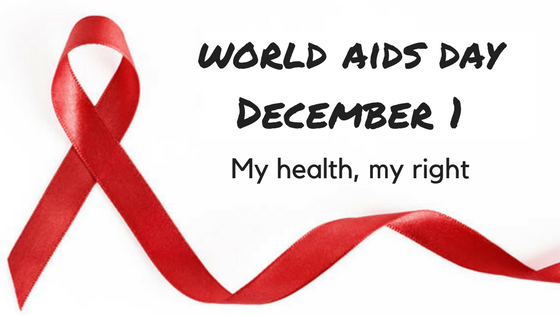
Today is World AIDS day and this year’s UN theme is “My health, my right”. This theme focuses on the right to health and access to health care. From the UN’s World AIDS day website, “Everyone, regardless of who they are or where they live, has a right to health, which is also dependent on adequate sanitation and housing, nutritious food, healthy working conditions and access to justice.” World AIDS day dates back to 1999 with the purpose of raising awareness, commemorating those who have passed on, and celebrating victories.
According to a new report from UNAIDS, access to HIV treatment has been greatly expanded. Only 685,000 people living with HIV had access to antiretroviral treatment in 2000. By June 2017 that number had risen to 20.9 million people. In 2000 there were approximately 40 million people with HIV/AIDS worldwide, that number dropped to 36.7 million by the end of 2016.
From 2008 to 2013 PfD implemented the Counseling, Care and Antiretroviral Mentoring Project (CAMP) in Nigeria, a program within the United States President’s Emergency Plan for AIDS Relief (PEPFAR). Nigeria has the second highest population of people living with HIV/AIDS in Africa. The primary goal of CAMP was to provide a comprehensive package of care for people living with HIV/AIDS with a focus on care for orphans and vulnerable children, the prevention of mother-to-child transmission, HIV counseling and testing, and antiretorviral treatment.
CAMP was implemented in four states in Nigeria: Akwa Ibom, Bauchi, Benue, and Delta. Some of the activities that PfD implemented in partnership with local entities were increased HIV testing, increased number of laboratories for testing, and recruitment of infected into treatment programs. Two of PfD’s most important contributions were building the capacity of local institutions to carry out prevention and treatment programs and raising the awareness of effected populations of their prevention and treatment options.
What can you do to help?
There are a number of ways to support the increase in access to treatment and the fight against the spread of HIV/AIDS. You could write letters in support of the PEPFAR program to your representatives. You can share news about HIV/AIDS (like this blog post!) with your social network to raise awareness. You could get active with a local HIV/AIDS treatment and prevention organization.
Sources:
UN page for World AIDS Day


To educate a girl child is to invest in a better tomorrow. The evidence is clear- investing in girls’ education results in strong economies as well as healthy and stable communities. However, the UNESCO Institute for Statistics (UIS) asserts that girls have a higher chance than boys of never setting foot in a classroom. Girls continue to face indomitable challenges, which pose a significant barrier to their education; therefore, Partners for Development (PfD) has initiated a campaign to educate and empower girls.
PfD’s Anne Johnson Memorial Scholarship Fund (AJMSF), named for our late colleague Anne Johnson, aims to support the education of girls in Nigeria, where there are gender disparities in education. Boys attend secondary school at a rate that is 10% higher than girls. The literacy rate among the 15-24 age group is 76% for males and only 58% for females (UNICEF, 2013). These disparities continue to grow in the poorer northern region, where girls are forced to work rather than continue beyond primary school.
The AJMSF provides support to girls, in the form of tuition and books, to support them through Junior Secondary School thus increasing the retention of girls in secondary schools in Nigeria. The majority of donations come from individuals, and it is through their generosity that we are able to cover 40-50% of each girl’s total annual school fees, insuring the sustainability of the fund. Since its inception in the 2014/2015 academic year, the AJMSF has supported the education of 48 Nigerian girls! PfD is immensely grateful for the generous donations, which have enabled us to empower these future leaders.
 Evelyn Ivie Igbalagh (pictured to the left), age 18, is the second of five children of Mr. and Mrs. Igbalagh. Her parents are peasant farmers living in a rural community, Ehor, in Edo State in southwestern Nigeria. Income from the family’s small farm makes it very difficult to afford school fees for Ivie and her four siblings (while public school theoretically should be free in reality parents are expected to contribute for school supplies, teacher compensation, and school lunches). At times, Ivie has been forced into street hawking to supplement her family’s income, a situation that can expose her to emotional and physical abuse. Ivie’s parents made the difficult choice of sending her to live with relatives in Benin City, capital of Edo State. In exchange for work that Ivie does at the relatives’ home they help cover some of her school costs.
Evelyn Ivie Igbalagh (pictured to the left), age 18, is the second of five children of Mr. and Mrs. Igbalagh. Her parents are peasant farmers living in a rural community, Ehor, in Edo State in southwestern Nigeria. Income from the family’s small farm makes it very difficult to afford school fees for Ivie and her four siblings (while public school theoretically should be free in reality parents are expected to contribute for school supplies, teacher compensation, and school lunches). At times, Ivie has been forced into street hawking to supplement her family’s income, a situation that can expose her to emotional and physical abuse. Ivie’s parents made the difficult choice of sending her to live with relatives in Benin City, capital of Edo State. In exchange for work that Ivie does at the relatives’ home they help cover some of her school costs.
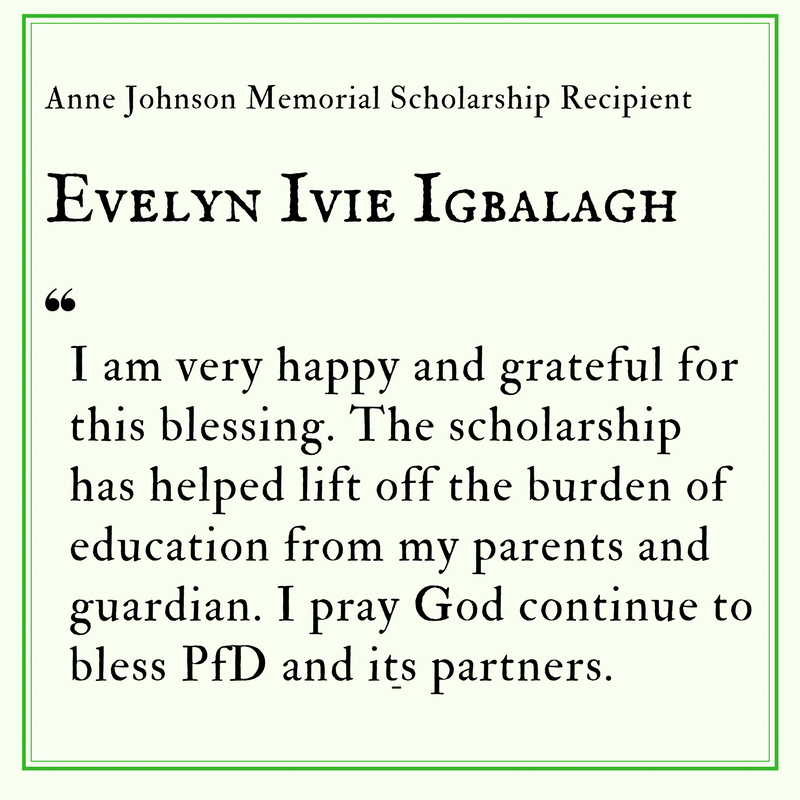 The relocation and level of poverty in her own family has slowed Ivie’s progression through the grades of secondary school. At age 18 she is several years older than most of her classmates because of her poor family status that is unable to pay for her education) at Uselu Junior Secondary School, Uselu, Benin City, Edo State where she is in her final year. Ivie is one of the Anne Johnson Memorial Scholarship recipients. She attends a mixed secondary school of about 3,000 students. Her favorite subject is Business Studies and she enjoys reading. Despite the many challenges she has faced Ivie is determined to move on to Senior Secondary School and complete the three years at that higher level. Learn more about the impact of the AJMS and read other success stories in the recent report.
The relocation and level of poverty in her own family has slowed Ivie’s progression through the grades of secondary school. At age 18 she is several years older than most of her classmates because of her poor family status that is unable to pay for her education) at Uselu Junior Secondary School, Uselu, Benin City, Edo State where she is in her final year. Ivie is one of the Anne Johnson Memorial Scholarship recipients. She attends a mixed secondary school of about 3,000 students. Her favorite subject is Business Studies and she enjoys reading. Despite the many challenges she has faced Ivie is determined to move on to Senior Secondary School and complete the three years at that higher level. Learn more about the impact of the AJMS and read other success stories in the recent report.
With the 2017/2018 Nigerian academic year commencing this October, consider making a donation to the AJMSF fund. Give the gift of a brighter future to girls like Ivie.

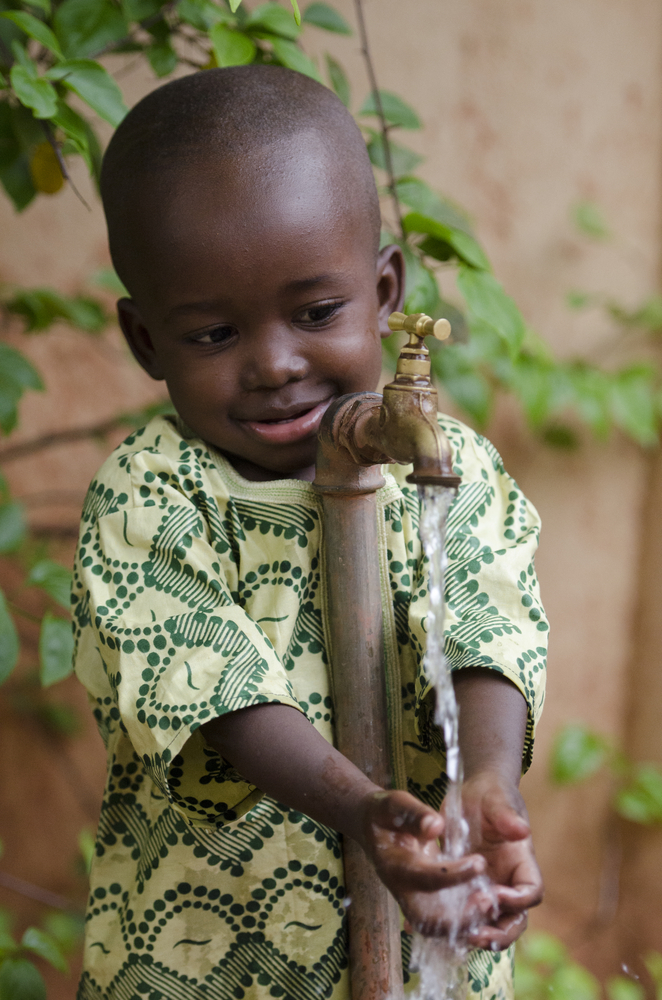
 Each year the Stockholm International Water Institute holds a week-long conference on global water issues in celebration of World Water Week. Scientists, public figures, business leaders, and young professionals gather to discuss and problem solve the world’s most pressing water concerns. Last year’s WWW had over 3,200 participants representing 330 organizations and 130 countries.
Each year the Stockholm International Water Institute holds a week-long conference on global water issues in celebration of World Water Week. Scientists, public figures, business leaders, and young professionals gather to discuss and problem solve the world’s most pressing water concerns. Last year’s WWW had over 3,200 participants representing 330 organizations and 130 countries.
This year’s theme “Water and Waste: Reduce and Reuse” was inspired by two Sustainable Development Goals:
![]()
SDG 6, Target 3: “by 2030, improve water quality by reducing pollution, eliminating dumping and minimizing release of hazardous chemicals and materials, halving the proportion of untreated wastewater and substantially increasing recycling and safe reuse globally.”
![]()
SDG 12, Target 5: “by 2030, substantially reduce waste generation through prevention, reduction, recycling and reuse.”
PfD is actively working to reach SDG 6 in Nigeria. Currently 2/3 of the population does not have access to adequate and safe water and/or sanitation. Therefore PfD is implementing, WADA in Nigeria. PfD is strengthening the capacity of local institutions; constructing and rehabilitating water, sanitation, and health facilities; and promoting hygiene in schools, health centers, and communities through collaboration with the State Governments of Abia and Cross River. Another Nigeria project, funded by UNICEF and supported by various local government agencies, strives to enhance the capacity building of local institutions to drive delivery of water, sanitation and hygiene, and other development services in their communities.
Be a part of the movement to solve global water issues by donating to PfD to help support its work, and learning more about how to cut down your personal water and food waste. The average individual in the United States uses about 80-100 gallons of water each day (USGS), not counting the amount of water it takes to produce the food we eat. It’s estimated that 50% of food is wasted globally and global agricultural production accounts for 92% of our water footprint. (Hoekstra and Mekonnen, 2011)
Therefore, reduce food waste by: prepping your meals and snacks; properly storing and freezing perishables; and creatively using nearly spoiled produce in stews, smoothies, pancakes, casseroles, and much more. In addition, make water-wise produce choices using the list below. For example, choose lentils over red meat to reduce the water footprint of your meal.
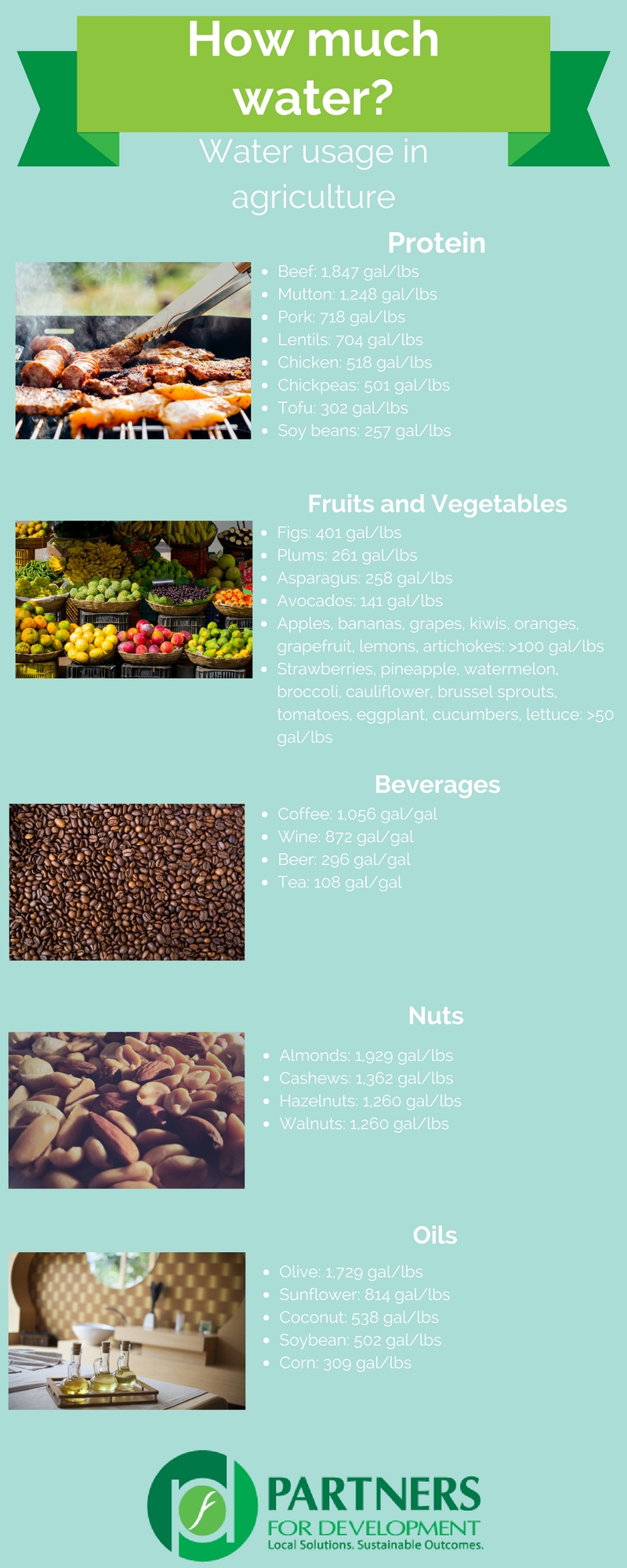
(SIWI 2017, USGS, Huff Post 2015)
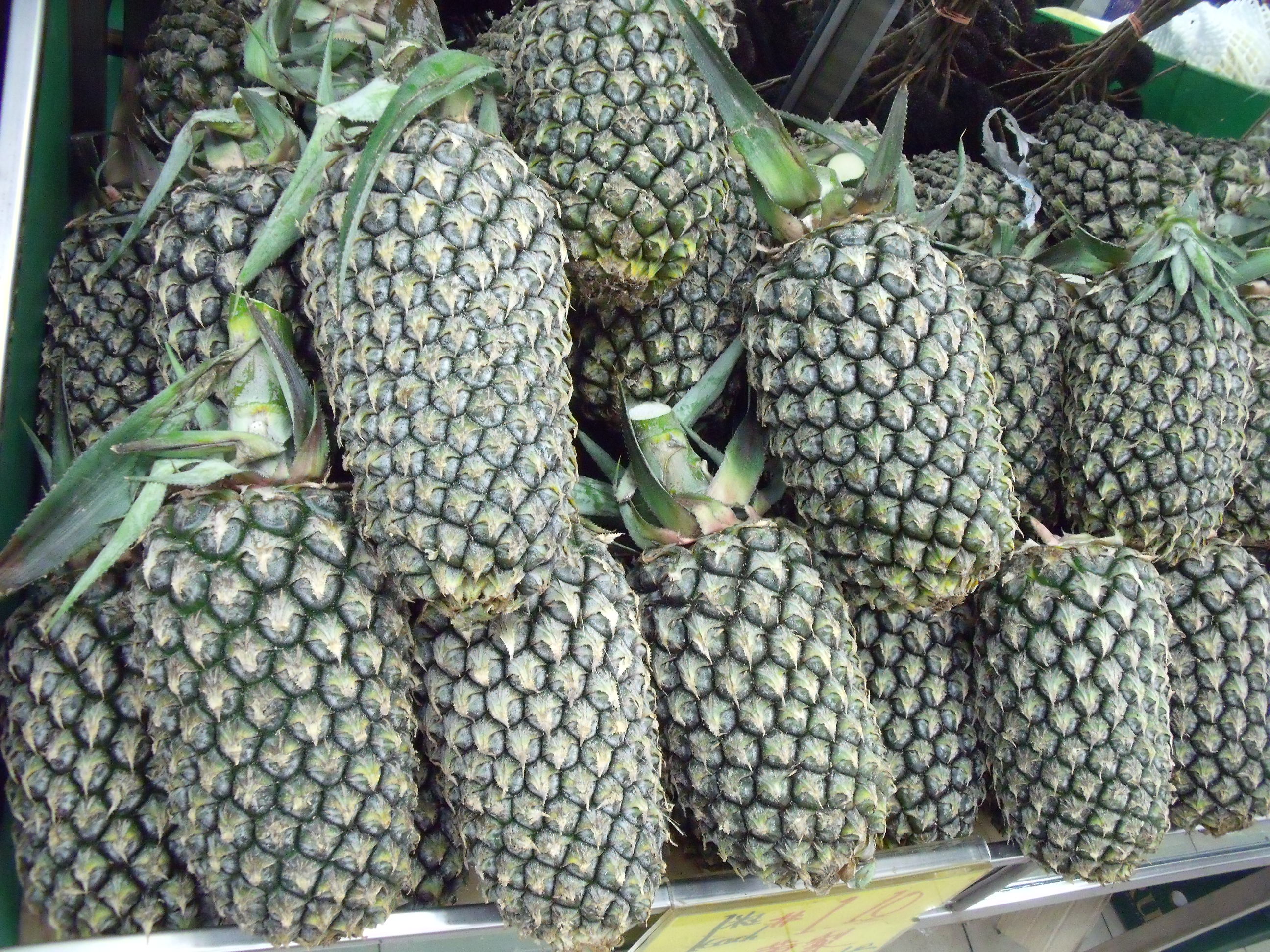
Today, June 27th, is World Pineapple day! At PfD we love this sweet, tangy, and delicious fruit, which has been integral to our efforts to promote economic growth in Benin. In this West African nation, Pineapples are the third most valuable crop in terms of GDP. Our Pineapples for Export (PINEX) project, launched in 2015, aims to strengthen all levels of the Beninese pineapple value chain.
Through activities such as building producers’ technical capacity and improving their access to resources (i.e. capital), PINEX is enabling the Beninese pineapple industry to increase productivity, improve quality, and increase exports. As Benin is heavily dependent on its agricultural trade, the Pineapple industry is improving the livelihoods of the Beninese people, and to us at PfD this is cause for celebration!
Pineapple Trivia!
Last year, we brought you 5 things you didn’t know about pineapples. This year, we have prepared pineapple trivia to test your knowledge!

#1 Pineapples are native to ____________.
- Sub-Saharan Africa
- East Asia
- South America
- North-Africa
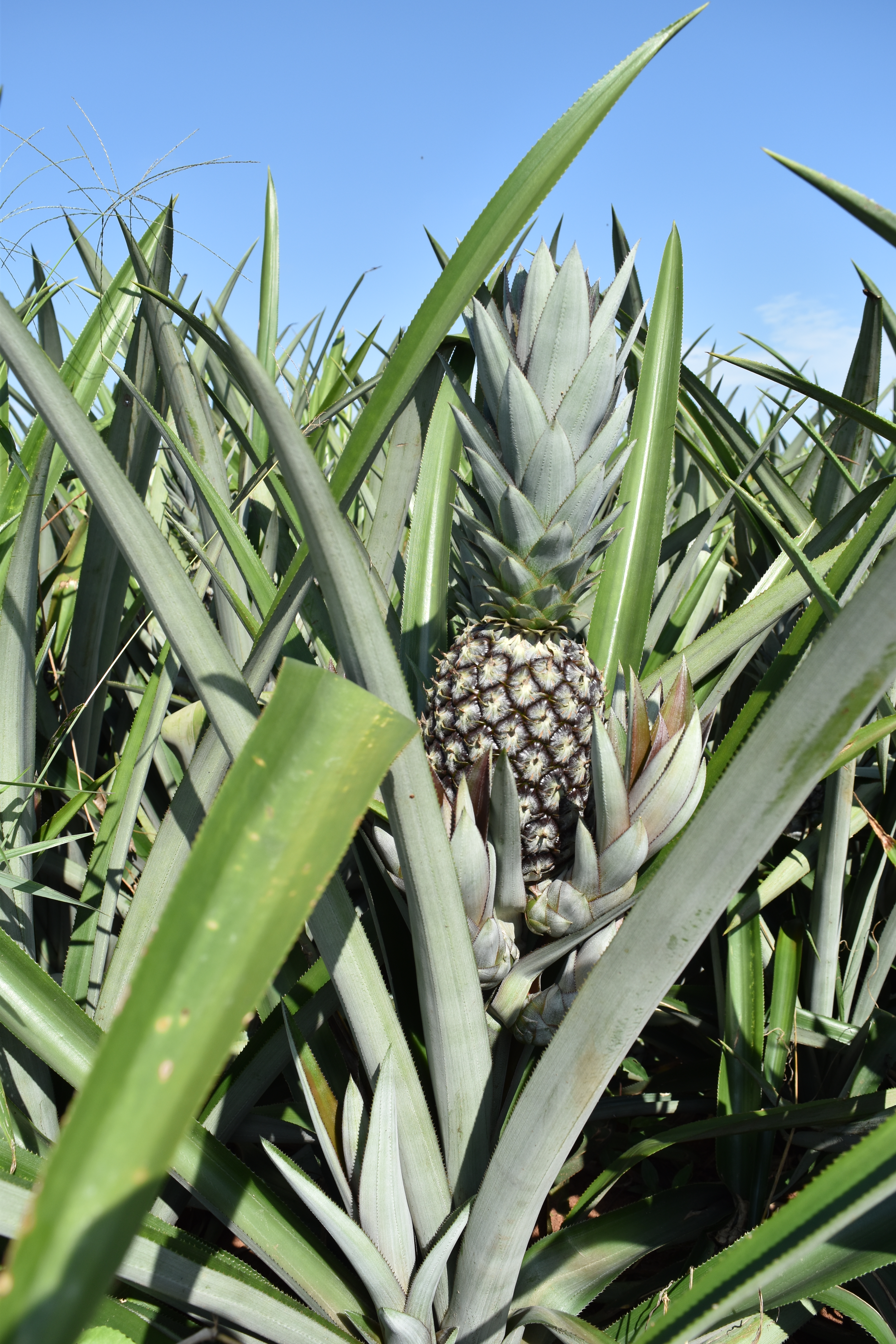
#2 Which country exports the most pineapples
- Costa Rica
- Benin
- South Africa
- Netherlands
#3 In which region are the majority of the world’s pineapples grown?
- Europe
- South America
- Southeast Asia
- Central America
#4 Once harvested, pineapples ripen within a week.
- True
- False
#5 The skins, core, and ends of a pineapple can be used to make which of the following?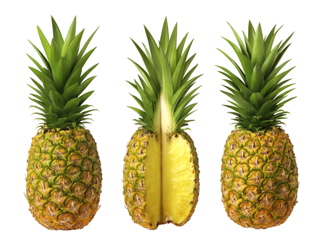
- Alcohol
- Vinegar
- All of the above
- None of the above
#6 What color are the pineapple plant’s flowers?
- Red
- Yellow
- Orange
- Trick question, pineapple plants don’t have flowers
Extra Credit Question
#7 What is your position on the age old debate about whether or not pineapple an appropriate pizza topping?
- I love some pineapple on my pizza!
- Pineapple does not belong on pizza!
- I can write you an essay about my stance
- I am undecided on the issue
Below are the trivia answers. Find out how you did!
#1 C #2 A #3 C #4 False #5 C #6 A



